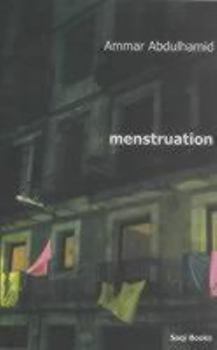Menstruation
Hasan, the local imam's son, has the strange ability to smell a menstruating woman among a thousand others. This helps him classify members of the opposite sex with whom he has little contact until the day he has a brief affair with a married woman. This sexual initiation irrevocably transforms him and shakes his entire system of beliefs. Hasan no longer knows what to believe in nor who he is, he just knows he has to avoid the marriage his father has arranged for him. Hasan's story runs in tandem with Wisam's, a friend of his sister's, who is unhappily married and having her first lesbian relationship. Her sense of alienation from her husband, her frustration and her newfound sexuality echo Hasan's questions about religion, identity and sexuality. Hasan and Wisam will both experience frustration, doubts and ultimately liberation in different ways. Their previously held notions about religion and sexuality are dramatically shaped by their new experiences and the influence of Nadim and Kindah, the progressive intellectuals who help them formulate a new worldview. Abdulhamid's daring debut novel explores contemporary themes related to sexuality, self-realization and repression within a conservative religious framework and the ways people are able to reconcile themselves with a changing world.
Format:Paperback
Language:English
ISBN:0863563120
ISBN13:9780863563126
Release Date:June 2001
Publisher:Saqi Books
Length:140 Pages
Weight:0.60 lbs.
Dimensions:0.5" x 5.3" x 8.5"
Customer Reviews
1 rating
A book about sexual limits, spiritual epiphanies, and social confinement...
Published by Thriftbooks.com User , 18 years ago
We do not remember our histories or our lives by those dull periods of conscious stasis; rather, we look upon those pivotal moments where our world-views are shaken, our emotions in shambles, and our futures unpredictable, as being the ones most important to defining ourselves. If it is indeed those moments of change that capture the essence of the human condition and define the individual, then Ammar Abdulhamid's taboo challenging Menstruation is about them; it is a novel about epiphanies. Menstruation is a ground-breaking novel, if not in its conclusion about the universality of the "Religion of Love," then in its noteworthy perspective from that of a former Muslim raised in Syria. Not shy with his subject matter, Abdulhamid does not hesitate to introduce the controversial subject matter of his book at the outset. The central character in the novel, Hasan, has refined his ability to identify menstruating women after years of scavenging through trash dumps for used tampons and developing a complicated classification system by odor and color. A peculiar admixture of revulsion and comedy, Hasan's sixth sense has a cleansing effect on the reader's mind, allowing for the complete absorption of other more pertinent issues presented in the text. Hasan's fetish for menstruation, which originates in his faulty belief that the fetus is nurtured upon blood in the womb, is later explained in one of the many interstitial narratives as being a symbolic purge in the human body; and, just as this purge occurs physiologically, it occurs also as "intellectual" and "spiritual menstruation." We are reminded, though, that despite the unsavory image of the menstrual cycle, that it "also denotes an ability to to bring forth a new life in this world"--whether it be intellectual, spiritual, or physical. These cycles, then, are the opportunities at which the personal epiphany manifests itself. A recurring theme throughout the novel is that of the characters' sexual exploits. We become intimate with Wisam, an unsatisfied married woman who wants love-not-sex from her begrudging husband, and her adventures into lesbianism and infidelity. The brutal and dehumanizing nature of the sex Wisam has with her husband contrasted with the orgasmic and convivial encounters she has with Batul and Fatin, two other women, demands that the definition of "love" and its relationship with social norms be challenged. Indeed, these encounters and the many others throughout the book do serve a higher intellectual purpose besides being provocative as explained in the unpublished final chapter of the book. At the same time, they also affect Wisam personally. "Nice people can't be devils regardless of certain acts of theirs," she repeats to herself as she makes love to Fatin. "How can a sin feel so right?" How is it that sex with her husband was okay but wholly unsatisfying and somewhat torturous, while this supposedly insidious encounter fulfilled her needs physically and emotionally? While





